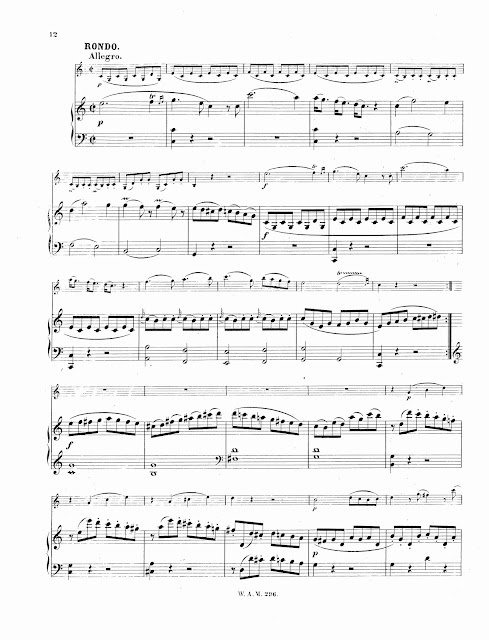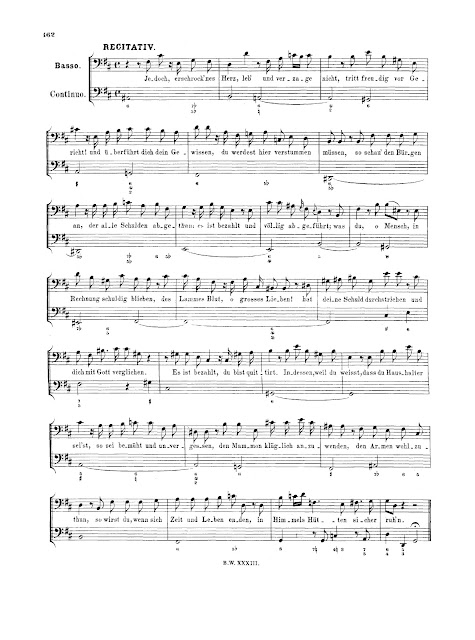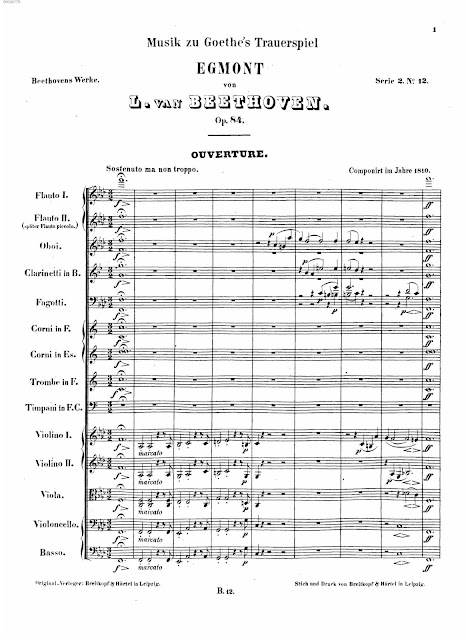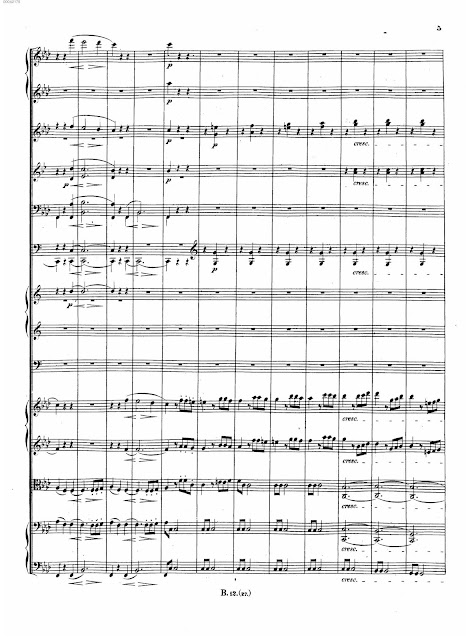CCLXIX. BEETHOVEN, Ludwig van (1770-1827)
Egmont, Op. 84 (1809-10)
1. Overture: Sostenuto, ma non troppo -- Allegro
2. Lied: "Die Trommel gerühret"
3. Entracte: Andante
4. Entracte: Larghetto
5. Lied: "Freudvoll and leidvoll"
6. Entracte: Allegro -- Marcia
7. Entracte: Poco sostenuto e risoluto
8. Klärchens Tod
9. Melodram: "Sußer Schlaf"
10. Siegessymphonie (symphony of victory): Allegro con brio
Gandula Janowitz, Soprano (Clärchen)
Erich Schellow, Speaker (Egmont)
Berliner Philharmoniker
Herbert von Karajan, (cond.)
(37:03)
Goethe's 1788 play (here; it took me 90 minutes to read) fired up Beethoven's imagination -- after all, the Eroica (see Post XXIX) was meant to convey the Hero, the man who valued Freedom and the Rights of Man above all else -- and of course when Napoleon proclaimed himself Emperor, Beethoven ripped up the dedication.
But in the Hero of Goethe's play -- Count Egmont (1522-1568) -- he had no fear of being contradicted in the present time.
Egmont was indeed an admirable hero for his times. The year of his death is, in fact, the first year of the Eighty-Years' War. And Goethe's play is confined to this date, as well.
**
On October 29, 1787, the Prague Opera was set to premiere Mozart's Don Giovanni. The story goes that Mozart was still writing the Overture on the 29th, and that the copyists were rushing the parts to the music stands just before the curtain fell -- the ink still wet.
In any case, it was not unusual for composers to save the overture for last. It's purpose is to introduce the themes for various characters in an instrumental context, so that when they appear in the production (opera, or in this case incidental music to a play), the audience has already been familiarized with the musical tropes.
Thus, this famous overture was the last of the ten parts to be composed.
And it is justifiably considered a giant in the works of the Master. Egmont's death is foreshadowed, as is the triumph of the ideas of freedom and liberty in the coda (which is reprised in the 10th movement: "The Symphony of Victory.")
In between are depictions of Clärchen's emotions and other elements taken from the plot of Goethe's play.
**
1. The Overture
That we are about to witness a tragedy is evident from the first unison F under a fermata. The stately, serious chords which follow -- in 3/2 time, a Baroque feeling -- deepen the feeeling. The winds follow with a melancholy four-note motif, that seems awfully familiar:
From the
Grosse Fuge, Op. 133 (see
Post CXLIV)
The Fuge theme is an exact inversion of the Egmont riff with the exception of the final interval (Minor Second vs. Major Second) ...
Later, we hear something very similar to some of the working out of the
Fifth Symphony.
Fifth Symphony:
That Beethoven's borrowed from himself is not in itself unusual. But these motivic phrases are powerful in either inversion and well-serve his purposes here.
2. Lied: "Die Trommel gerühret"
The drum beats, (timpani)
the fife squeals! (piccolo)
My lover, fully armed,
leads on his troop;
lance held high,
he rules the people.
How my heart beats!
How my blood races!
O had I but a doublet
breeches and helmet!
I'd follow him with bold steps
through the city gates
and go through the provinces,
go everywhere with him.
The enemy is retreating,
we shoot into them!
What fortune beyond compare
to be a man!
It would be four more centuries before she'd be allowed in some country's military ...
The second section anticipates the action in Act II, depicting the excitement of the crowd.
**
3. Entracte: Andante
This one somberly relates to the end of Act II in which Orange warns Egmont that the Spanish leadership is about to change from the accomodating Regent Margaret to the ruthless Duke of Alba; and looks forward to Act III, where Margaret despairs of Alba's impending rule.
4. Entracte: Larghetto
5. Lied: "Freudvoll and leidvoll"
Clärchen declares her undying love for Egmont:
Joyful
and sorrowful,
sunk in thought,
longing
and fearful
in painful suspense,
rejoicing to heaven,
grieving to death --
happy alone is the heart
that is in love.
6. Entracte: Allegro -- Marcia
Clärchen's emotions after the sensitive scene with Egmont ending Act III. The march signifies the arrival of Alba and his troops.
7. Entracte: Poco sostenuto e risoluto
Goethe and Beethoven refer back to #4 where Orange had warned Egmont. Now Beethoven anticipates Clärchen's tragic fate.
8. Klärchens Tod
Clärchen's despair.
9. Melodram: "Sußer Schlaf"
The narrator assumes Egmont's voice, in jail, awaiting his execution:
Sweet sleep! You come as pure chance, most readily when asked, unsought. You loosen the bonds of painful thoughts, mingle all images of joy and sorrow; the circle of inner harmonies flows without hindrance, and we sink, enveloped in a pleasing delusion, and cease to be.
(He falls asleep; music accompanies his slumbers.)
The wall opens.
The wreath (Clärchen's image) has vanished! Beauteous image, the light of day has frightened you away! Yes, they were there, the two sweetest joys of my heart were united there. Divine liberty borrowed the shape of my beloved: the enchanting maiden arrayed herself in my friend's heavenly robe. In one serious moment they appeared combined, more serious than lovely.
With bloodstained feet she stepped before me, the fluttering folds of her garments spotted with blood. It was my blood and that of many noble souls. No, it was not shed in vain. Forward, gallant people! The goddess of victory leads you! And as the sea breaks through your dams, so break and tear down the wall of tyranny and sweep it away in a flood from the land it has usurped!
Hark! Hark! How often that sound has summoned me with unhampered steps to the field of battle and victory!
(Drum on the stage, rather slow and distant)
I go forth from this prison to meet a glorious death; I die for freedom, for which I lived and fought, and to which I now resignedly sacrifice myself.
(Drums nearer. He perceives Spanish soldiers in the background.)
Yes, lead them on! Close your ranks; you do not frighten me! I am used to standing in front of spears, facing spears. The enemy encircles you on every side! Swords are gleaming -- friends, have courage! You have behind you parents, wives, children!
(pointing to the guards)
And these are driven only by a hollow word from their master, not by the convictions. Protect what is yours! And to save what you hold most dear, fall joyfully, as I set you an example!
10. Siegessymphonie (symphony of victory): Allegro con brio
The Symphony of Victory.



















































